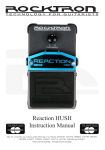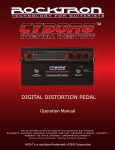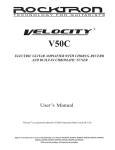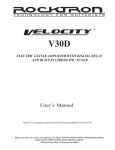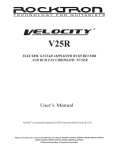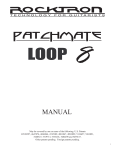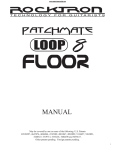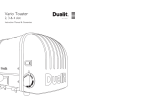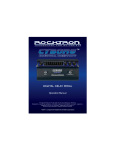Download Rocktron Unity Tuner Instruction manual
Transcript
Unity Tuner Instruction Manual This pedal is: Compliance Your Unity Tuner™ pedal has been tested and complies with the following Standards and Directives as set forth by the European Union: Council Directive(s): 89/336/EEC Standard(s): EN55013, EN50082-1 Electromagnetic Compatibility This means that this product has been designed to meet stringent guidelines on how much RF energy it can emit, and that it should be immune from other sources of interference when properly used. Improper use of this equipment could result in increased RF emissions, which may or may not interfere with other electronic products. To insure against this possibility, always use good shielded cables for all audio input and output connections. This will help insure compliance with the Directive(s). For more information about other Rocktron products, please see your local dealer or one of our importers closest to you (listed on the Rocktron website (www.rocktron.com). Read all instructions contained in this manual. Keep these instructions Heed all warnings Follow all instructions. Do not use this apparatus near water. Clean with dry cloth Copyright © 2011 GHS Corporation All Rights Reserved. Precautions Refer all service to qualified service personnel. Servicing is required when the apparatus has been damaged in any way, such as power supply or plug is damaged, liquid has been spilled or objects have fallen into the apparatus or if the apparatus has been exposed to rain or moisture, does not operate normally or has been dropped. DO NOT ATTEMPT TO SERVICE THIS EQUIPMENT. QUALIFIED PERSONNEL SHOULD SERVICE THIS EQUIPMENT ONLY. DO NOT MAKE ANY INTERNAL ADJUSTMENTS OR ADDITIONS TO THIS EQUIPMENT AT ANY TIME OR TAMPER WITH INTERNAL ELECTRONIC COMPONENTS AT ANY TIME. FAILURE TO FOLLOW THESE INSTRUCTIONS MAY VOID THE WARRANTY OF THIS EQUIPMENT AS WELL AS CAUSING A SHOCK HAZARD. OPERATING TEMPERATURE Do not expose this unit to excessive heat. This unit is designed to operate between 32 F and 104 F (0 C and 40 C). This unit may not function properly under extreme temperatures. Do not block any ventilation openings (if applicable). Install in accordance with the manufacturer’s instructions. Do not install near any heat sources such as radiators, heat registers, stoves or other apparatus (including amplifiers) that produce heat. This product is not equipped with a plug or cable. This pedal runs on a 9 Volt Battery, if a 9Volt DC adapter is the used please follow adapter manufacturer’s operation instructions. Only used attachments/accessories specified by the manufacturer. Do not use this product with any case, stand tripod, bracket or table that is not specified by the manufacturer. Insure that the case, stand, tripod, bracket etc. is properly adjusted and setup (follow all instructions). Extra care and caution should be taken to avoid tip over and injury. Unplug this apparatus during lightening storms or when unused during long periods of time. Introduction: Congratulations on your purchase of the Rocktron Unity Tuner. The Unity Tuner is a true “on-stage” tuner for any gig. The Unity Tuner’s large LED NOTE display makes it easy to see what note you are tuning, even from a distance. Several Red LEDs are also used to help you easily determine if you are sharp or flat and by how much. A unique feature to the Unity Tuner are the photocells. These photocells sense the lighting situation you are playing in and adjust the brightness of the LED Note Display to accommodate that lighting. When you are playing outside on a sunlit stage, the photocells sense that the area is bright and increase the LED intensity making the LEDs brighter and easier to see. The opposite effect happens when playing on a dark, low light situation. The photocells sense that the lighting is low and dim the LED Note Display making it easier on the eyes. The Unity Tuner is equipped with a “STROBE” function for those who require extremely accurate tuning. The STROBE function is a sensitive tool that really allows you to dial in the exact tuning. Two outputs are provided as well. The jack marked “OUTPUT” provides a constant signal path to other effects or amps when you turn on the tuner. This allows you to hear what you are tuning through your amp. When the “OUTPUT (MUTE)” is used, the Unity Tuner cuts the signal to the next effect or amp and allows you to tune in silence, This is a very useful on-stage tool. You are now ready to tune in all playing situations! Descriptions Descriptions continued......... 1 DISPLAY Window - This black window houses the LEDs and controls for the Unity Tuner 2 NOTE LED BANK - This bank of blue LEDs will display the note being played or tuned. 3 IN TUNE Green LED - when the note being played is “in tune” this LED will light. 4 9VDC Input - This input jack provides 9VDC power to the pedal from the Rocktron DC OnTap 9V power supply (sold separately). 5 SHARP/FLAT LEDS - These Red LEDs show you if your note is Sharp or Flat. Red LEDs to the right of the green LED are sharp and the string should be tuned down. The farther right the LED is away from the Green in Tune LED the more the note is SHARP. Red LEDs to the left of the green LED are flat and the string should be tuned up. The farther left the LED is away from the Green in tune LED the more the note is flat. 6 SHARP/FLAT Indicator - If the note being played is “sharp” the “sharp” (#) symbol will “light.” 7 STROBE Button - To turn ON or OFF “strobe” tuning press this button. To learn how to use the “strobe” function, see section called “STROBE TUNING” later in this manual. 8 INPUT Jack - Using a standard 1/4” guitar cable, plug your guitar into this jack. 9 PHOTOCELLS - These two photocells sense the lighting of the venue you are playing. When playing outside on a bright sunny day, the NOTE LEDs will increase in intensity slightly to make it eaiser to see. When playing on a dark stage the NOTE LEDs will decrease in intensity. 10 FOOTSWITCH - Use this switch to turn the pedal ON or OFF Descriptions continued......... 11 CALIBRATE button - this button is used to calibrate the tuner to match the pitch of any instrument or audio source (like an old piano or tape player). For details on this function - see section titled “Calibration.” 12 OUTPUT Jack - This jack provides output to your amp or the next pedal in the signal chain. Use a 1/4” guitar cable to plug into the next effect or into a guitar amplifier. This jack provides a contant output whether the tuner is on or off and does not mute the output. 13 OUTPUT JACK (MUTE)- This jack provides output to your amp or the next pedal in the signal chain. Use a 1/4” guitar cable to plug into the next effect or into a guitar amplifier. This jack will MUTE the output to the next pedal or amp when the tuner is turned on. This is ideal for silent tuning on stage. MUTED Connection CONSTANT Connection Tuning Instructions: Step 1 - plug the guitar/bass into the tuner - see “connections” section. Step 2 - play a note on your guitar. Pluck your E string, if needed, adjust your tuning machine on your instrument until the letter “E” appears in the NOTE Display window. Step 3 - if your note is flat - the “FLAT” LEDs to the left of the IN TUNE green LEDs will light. The farther away the red LED is from the green IN TUNE LED the more flat the tuning is. If a Flat LED is lit, tune your string up. During this process the LEDs will begin to light and move closer to the green IN TUNE LED. Step 4 - if your note is sharp - the “SHARP” LEDs to the right of the IN TUNE green LEDs will light. The farther away the red LED is from the green IN TUNE LED the more sharp the tuning is. If a sharp LED is lit, tune your string down. During this process the LEDs will begin to light and move closer to the green IN TUNE LED. Step 5 - Continue with step 3 or step 4 until the flat or sharp LEDs are not lit and the green “IN TUNE” LED lights. At this point the string is in tune. Step 6 - Continue steps 2-5 but using your other strings on your guitar or bass. Tuning Instructions - STROBE: The STROBE function of the UNITY Tuner is extremely senstive. Step 1 - plug the guitar/bass into the tuner and press the “STROBE” button. At this point the RED LEDs will appear to rotate counter clockwise. Step 2 - play a note on your guitar. Pluck your E string, if needed, adjust your tuning machine on your instrument until the letter “E” appears in the NOTE Display window. Step 3 - if your note is flat - the red LEDs will appear to be rotating counter clockwise, showing you that the note being played is flat. The faster the LEDs rotate counter clockwise, the more flat the tuning is. Tune your string up. During this process the rotation of the LEDs will appear to slow down as you approach being in tune. When the LEDs don’t appear to be rotating and the green IN TUNE LED lights, then the note is in tune. Step 4 - if your note is sharp - the red LEDs will appear to be rotating clockwise, showing you that the note being played is sharp. The faster the LEDs rotate clockwise, the more sharp the tuning is. Tune your string down. During this process the rotation of the LEDs will appear to slow down as you approach being in tune. When the LEDs don’t appear to be rotating and the green IN TUNE LED lights, then the note is in tune. Step 5 - Continue with step 3 or step 4 until the flat or sharp LEDs don’t appear to be rotating and the green “IN TUNE” LED lights. At this point the string is in tune. Step 6 - Continue steps 2-5 but using your other strings on your guitar or bass. Calibration: To match the pitch of any instrument or audio source (like an old piano or tape player) press the “Calibrate” button while simultaneously playing the note on the instrument. (Note: you might have to first tune one string on the guitar or bass by ear to match the actual note if the piano is out of standard tuning or if the tape player you are playing along with runs slower or faster than normal). Once you have one note on the guitar tuned to the source - simply play that note on the guitar - while the note is “ringing” press the Calibrate button. The tuning pitch of the tuner will automatically be shifted to match the pitch of the audio source. Release the button and tune the remaining strings as normal with the tuner. The tuner at this point has automatically adjusted the tuning range to match that pitch. To reset the tuner to standard 440Hz pitch turn off the tuner and then back on again with the footswitch (see controls - point 6). Hints and Tips: The Unity Tuner is sensitive, so it is not necessary to strike your string very hard. Standard string attack will work. Additionally, if you are in a loud environment try using harmonics to tune your instrument. Lightly touch the string over the 12th fret of your instrument and pick the string with normal pick attack. This will create a harmonic. It will work on all strings. The MUTED Output is ideal for tuning in live situations. This allows you to tune without everyone in the audience hearing you tune. Additionally, this will mute the signal going to your amplifier which will help you keep down noise generated if you are using a high gain amplifier. As with all stomp boxes, when you are not using it, unplug all cables to prolong battery life. Specifications Maximum Input Maximum Output Input Impedance Output Impedance Current Consumption Power Requirements Dimensions Weight 3.8dBu 5.8dBu 1MΩ 100Ω 15mA 9V Alkaline Battery or Rocktron DC OnTap Universal Power Supply (sold separately). Negative tip. 95mm x 120mm x 56mm 3.75” x 4.75” x 2.25” 450g 15.87 oz How to change the battery: To change the battery, turn the pedal over and remove the 4 screws on the bottom. Remove the back cover. Carefully remove the old battery and replace it with a new 9V Alkaline battery. Replace battery in the same area as the old battery was located. Place the back cover on the pedal and re-insert the screws. Save yourself tons of money in batteries by using the Rocktron DC OnTap Universal Power Supply to power this pedal (sold separately). The Rocktron DC OnTap provides a constant flow of power to the pedal, unlike a battery that will degrade over time. The Rocktron DC OnTap Universal Power Supply can also power up to 20 pedals and can be used with both 110V and 220V power sources. Check, www.rocktron.com for more information on the DC OnTap and where to purchase. Rocktron - A Division of GHS Corporation 2813 Wilber Ave Battle Creek MI 49037 USA www.rocktron.com [email protected] tel: 1-269-968-3351 rev. 060711 2011.1
















